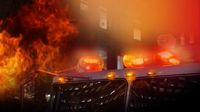The tranquility of Edisto Island, South Carolina, was shattered on the morning of October 4, 2025, when a massive fire engulfed and destroyed the $1.5 million beachfront home of Circuit Court Judge Diane Goodstein. The blaze, which tore through the luxury property in the Jeremy Cay gated community, left the home a pile of smoldering embers and sent shockwaves through both the local community and the wider political world.
Judge Goodstein, 69, was out walking her dogs when the fire broke out, but inside the house were her husband, former Democratic State Senator Arnold Goodstein, 81, their son, and another individual. As flames rapidly consumed the home, the trio made a desperate escape, jumping from an upstairs window and balcony before fleeing into the marsh behind the property. Emergency responders, hampered by the remote location and limited water supply, used kayaks to reach the stranded family members and bring them to safety. All three were hospitalized for their injuries, with one airlifted due to the severity of their wounds. According to USA TODAY, Arnold Goodstein suffered multiple broken bones in the ordeal.
The fire’s cause quickly became the subject of intense speculation, fueled in part by video footage that went viral online. Many observers, noting Judge Goodstein’s recent involvement in a politically charged ruling, leapt to conclusions about possible motives. As reported by The Post and Courier, some media outlets and social media pundits hinted at arson and a political motive, suggesting that the blaze was retribution for Goodstein’s September 2025 decision to temporarily block South Carolina from handing over sensitive voter registration data to the Trump administration.
The case at the heart of the controversy involved a request from the U.S. Department of Justice for the personal information of more than 3.3 million South Carolina voters. The federal government sought the data to cross-reference against other databases, ostensibly to root out alleged illegal voting. Judge Goodstein ruled in favor of plaintiff Anne Crook, a local voting rights activist, issuing a temporary restraining order that sided with privacy advocates and put her at odds with both President Donald Trump’s administration and South Carolina’s Republican Governor Henry McMaster. The ruling was short-lived, however; on September 11, 2025, the South Carolina Supreme Court overturned Goodstein’s order in a six-page opinion, clearing the way for the data transfer.
The political temperature only rose after the fire. On October 5, U.S. Representative Daniel Goldman, a New York Democrat, took to X (formerly Twitter) to accuse Trump, White House Deputy Chief of Staff Stephen Miller, and the so-called “MAGA-world” of “doxxing and threatening judges who rule against Trump, including Judge Goodstein.” He went further, writing, “Today, someone committed arson on the Judge’s home, severely injuring her husband and son. Will Trump speak out against the extreme right that did this?”
Stephen Miller, for his part, fired back on X, calling Goldman’s comments “deeply warped and vile” and accusing Democrats of “libelous madness.” He insisted, “While you post your libelous madness, we will keep focused on delivering public safety and fighting domestic terror.” The charged exchange, covered by Newsweek and other outlets, exemplified the broader climate of suspicion and hostility that has come to surround high-profile judicial figures in recent years.
Yet, even as rumors swirled and political rhetoric intensified, South Carolina officials moved swiftly to tamp down speculation. On October 7, State Law Enforcement Division (SLED) Chief Mark Keel issued a statement saying, “At this time, there is no evidence to indicate the fire was intentionally set.” He added, “SLED agents have preliminarily found there is no evidence to support a pre-fire explosion,” suggesting that investigators believed the fire was likely the result of a domestic accident rather than foul play. Keel urged, “I urge our citizens, elected officials, and members of the press to exercise good judgment and not share information that has not been verified.” Governor McMaster echoed this sentiment, writing on X, “SLED Chief Mark Keel has announced that at this point in the investigation, there is no evidence the horrific fire at Judge Goodstein’s Edisto home was intentionally set. I echo Chief Keel’s call for everyone to exercise good judgment and avoid sharing unverified information while the investigation continues.”
Despite the official reassurances, the incident has reignited debate about the safety of judges and the increasing threats they face. The South Carolina Association of Justice released a statement following the fire, noting, “Our judges dedicate their lives to upholding justice and fairness under the law, setting aside personal and political beliefs to serve the public. Their work is demanding and often thankless. Every ruling means someone leaves the courtroom unhappy or even facing jail time. They deserve our full support, protection, and gratitude for the sacrifices they make to maintain justice.”
Judge Goodstein herself has kept a low profile in the aftermath of the disaster. In her only public comment to date, she told the Daily Mail she was “alright,” and sounded “cheerful” over the phone. The South Carolina Judicial Branch has stated it will not make further comments until law enforcement concludes its investigation.
The fire has also drawn attention to the unique challenges of emergency response on Edisto Island. According to the St. Paul’s Fire Department, the home’s location on a remote barrier island created “significant challenges such as limited water supply and tight areas.” The department explained that rescuers had to use kayaks to reach and evacuate the occupants because of the marshy terrain and the layout of the lot.
As the investigation continues, the story of Judge Goodstein’s house fire remains a potent symbol of the intersection between personal tragedy, political controversy, and the challenges of public service. While officials have found no evidence of arson or deliberate harm, the incident has underscored the risks faced by those who serve in the judiciary—risks that are all too real in an era of heightened political polarization and social media-fueled rumor. For now, Edisto Island’s quiet rhythms have been disrupted, but the search for answers—and for a return to calm—goes on.


